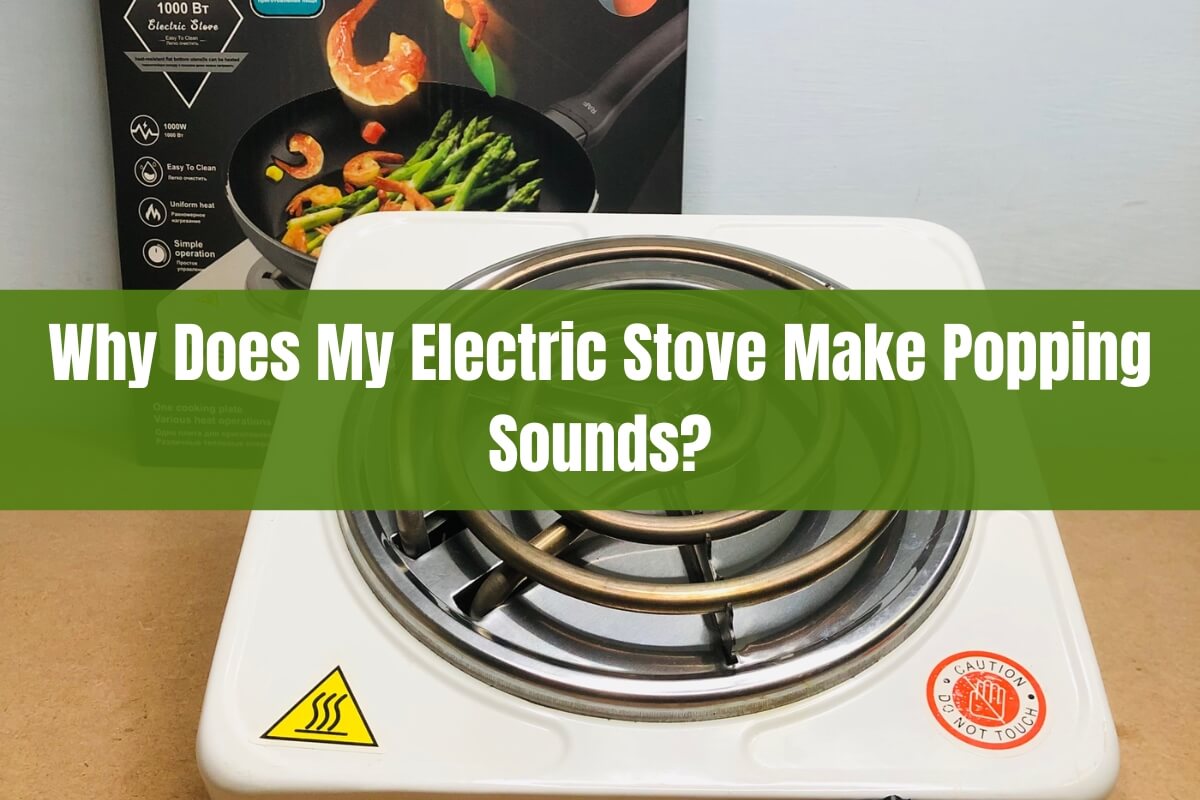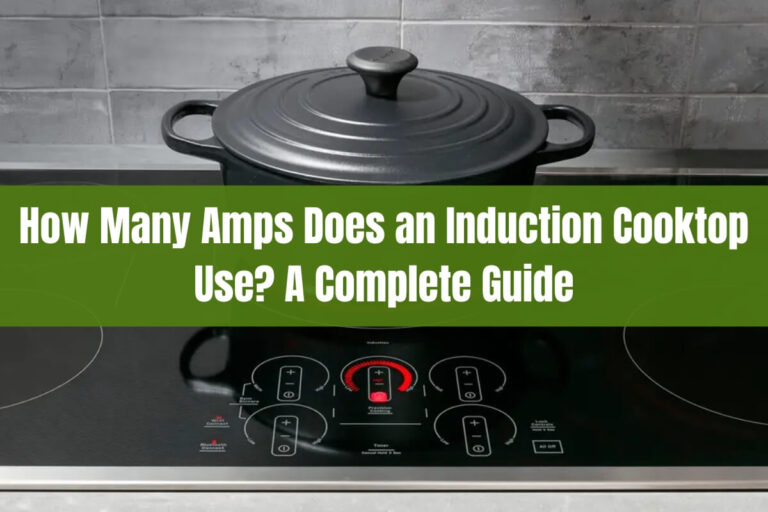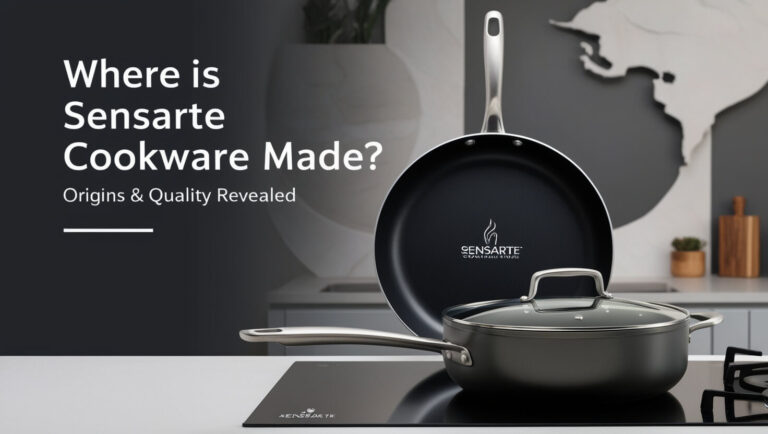
We’ve all been there – you’re cooking a delicious meal when suddenly, your electric stove starts making strange popping or cracking noises. It can be alarming, especially if you’re unsure what’s causing it. Is it a sign of a serious problem? Or is it just a normal occurrence with electric stoves?
The short answer is that occasional popping sounds from an electric stove are usually normal and not a major concern. However, in some cases, excessive popping or popping accompanied by other issues could indicate a problem that needs to be addressed.
This guide will explore the common causes of popping sounds in electric stoves, help you identify when it might be a more serious issue, and provide tips for troubleshooting and preventing these noises. We’ll cover:
- What causes electric stoves to make popping sounds
- Whether popping noises are dangerous or just normal operation
- Other common electric stove problems that can lead to popping
- How to troubleshoot and fix popping sound issues
- Steps you can take to prevent popping sounds
- When to call in a professional for electric stove repair
Whether you’re a seasoned chef or a kitchen novice, understanding why your electric stove is making popping noises can help you determine if it’s a cause for concern and what steps to take next. So, let’s dive in!
What Causes an Electric Stove to Pop?
There are several reasons why an electric stove might make popping or cracking sounds during operation. Most of these causes are related to the normal heating and cooling processes that occur within the stove’s various components.
Infinite Control Switch
One common cause of popping sounds is the infinite control switch, which regulates the heat settings on your electric stove burners. When you turn a burner on or adjust the temperature, the switch makes electrical contact, which can sometimes produce a popping or clicking sound. This is a normal part of the switch’s operation and usually not a cause for concern.
Expanding Metallic Components
Electric stoves contain many metallic parts, such as the oven cavity, burner elements, and various brackets and housings. As these metal components heat up during use, they naturally expand. If the expansion happens too quickly, it can result in popping or cracking noises as the metals shift and rub against each other or other surfaces.
Glass Cooktop Movement
If your electric stove has a glass cooktop, the popping sounds you’re hearing could be caused by the glass temporarily breaking free and moving slightly. Unlike traditional coil burners, glass cooktops are not firmly attached to the stove but rather have anchor points that allow for some movement as the glass heats up and cools down. When the glass suddenly breaks free from these anchors, it can make a popping sound as it moves and then settles back into place.
Heating and Cooling of Oven Components
Inside the oven cavity itself, the heating and cooling of various components like the porcelain oven walls and steel racks or shelves can also contribute to popping or cracking noises. As these materials expand and contract at different rates during heating and cooling cycles, they can shift and rub against each other, creating audible sounds.
Movement of Electric Heating Elements
Finally, the movement of the electric heating elements themselves within their mounting brackets can sometimes cause popping or cracking sounds. As the elements heat up and cool down, they may slightly shift or vibrate within their housings, leading to noise.
While all of these causes are generally considered normal and not a major concern, excessive or persistent popping sounds could potentially indicate a more serious issue that needs to be addressed.
Is a Popping Electric Stove Dangerous?
In most cases, no – occasional popping or cracking sounds from an electric stove during operation are not inherently dangerous. These noises are simply a result of the normal heating and cooling processes occurring within the stove’s various components.
However, if the popping sounds are excessive, persistent, or accompanied by other issues like the stove not working properly, excessive smoke or burning smells, or any visible damage, it could be a sign of a more serious underlying problem that needs to be addressed.
Some common electric stove problems that can cause popping sounds and potentially pose safety risks include:
- Constant clicking or popping when turning the stove on, which could indicate issues with the infinite control switch, electrical connections, or other components
- Burners not turning on or off properly, which could be caused by defective burners, faulty wiring, or switches
- Burners not heating up sufficiently, potentially due to damaged heating elements, power issues, or loose wiring
- Cracked or damaged glass cooktops, which could result from impact, excessive heat, or thermal shock
If you notice any of these issues in addition to popping sounds, it’s important to take action to resolve the problem and ensure the safe operation of your electric stove.
Common Electric Stove Problems That Cause Popping
While popping sounds alone are usually not a major concern, they can sometimes be a symptom of other underlying issues with your electric stove. Here are some common problems that can lead to popping noises, and how to identify them:
Constant Clicking or Popping Sound When Turning On
If your electric stove makes a constant clicking or popping sound every time you turn it on, it could be caused by a few different issues:
- Infinite control switch making electrical contact: As mentioned earlier, the infinite control switch can sometimes produce a popping sound when making electrical contact as you turn on a burner or adjust the temperature.
- Metallic components expanding too quickly: If the metallic components within the stove are expanding too quickly as they heat up, it can cause popping or cracking noises.
Burner Won’t Turn On or Off
If one of your electric stove burners won’t turn on or off properly, it could be due to:
- A defective burner element that needs to be replaced
- A faulty electrical connection or wiring issue in the burner socket or control panel
- A failed burner control switch or knob
Burner Not Getting Hot Enough
If your electric stove burners aren’t heating up sufficiently, it could be related to one or more of the following issues:
- A damaged or worn-out heating element that needs to be replaced
- Problems with the power source or electrical receptacle the stove is plugged into
- Loose or burnt wiring connections within the stove
- A defective selector switch or control panel component
Cracked Glass Stovetop
While glass cooktops are durable, they can still crack or break due to certain factors, including:
- High impact from dropped pots, pans, or other objects
- A buildup of micro-scratches or surface damage over time
- Excessive heat or hot spots created by spilled food or improper cookware
- Thermal shock from sudden temperature changes (e.g., placing a hot pot on a cool cooktop surface)
If you notice any cracks or damage to your glass cooktop, it’s important to address the issue promptly, as it can lead to further damage or potential safety hazards.
In many cases, these common electric stove problems can contribute to or exacerbate popping sounds. If you’re experiencing excessive popping along with any of these issues, it’s a good idea to troubleshoot the problem further or seek professional repair assistance.
How to Troubleshoot and Fix Popping Sounds
If your electric stove is making excessive or concerning popping sounds, there are a few troubleshooting steps you can take to try to identify and resolve the issue:
- Inspect for visible damage: Start by carefully examining the stove for any visible signs of damage to the heating elements, wiring, or connections. Look for any burnt or frayed wires, damaged elements, or other obvious issues that could be causing the popping sounds.
- Test heating elements: If the popping sounds seem to be coming from a specific burner or heating element, you can test the element with a multimeter to check for continuity. If there is no continuity (indicating a break in the element), the heating element likely needs to be replaced.
- Check circuit breakers and fuses: If the popping sounds are accompanied by the stove not working at all, check your home’s circuit breaker panel to see if the breaker for the stove has tripped. Some electric stoves also have internal fuses that can blow, so you may need to consult your owner’s manual to locate and check these fuses.
- Reset or replace components: Depending on your troubleshooting findings, you may be able to reset tripped breakers or replace blown fuses to resolve the issue. However, if the problem seems to be with a specific component like a heating element, burner switch, or control panel part, you may need to replace that component.
- Consult the repair manual or seek professional help: If you’re unable to identify or resolve the issue through basic troubleshooting, it’s generally recommended to consult your electric stove’s repair manual or contact a professional appliance repair service. Attempting to repair complex electrical issues or disassemble major components of your stove without proper knowledge and guidance can be dangerous and may void your warranty.
A qualified appliance repair technician will have the expertise and specialized tools to accurately diagnose and address any underlying issues causing the popping sounds or other malfunctions in your electric stove. They can also advise you on whether a repair is feasible or if replacing the stove may be a more cost-effective solution, especially for older models or persistent, recurring problems.
Preventing Popping Sounds in Electric Stoves
While occasional popping sounds are often normal and unavoidable, there are some steps you can take to help minimize the frequency and severity of these noises in your electric stove:
- Follow manufacturer’s usage and cleaning instructions: Proper use and maintenance of your electric stove can help prevent premature wear or damage that could contribute to popping sounds. Be sure to follow the manufacturer’s recommendations for cleaning, usage, and general care.
- Avoid slamming the oven door or placing heavy objects on the cooktop: Sudden impacts or excessive weight on the glass cooktop can cause it to shift or break free from its anchors, leading to popping sounds as it moves and settles back into place.
- Schedule regular maintenance and inspections: Having a professional appliance technician inspect and service your electric stove on a regular basis can help identify and address any potential issues before they become more serious problems.
- Consider replacing an older electric stove if problems persist: If your electric stove is older and continues to experience frequent or severe popping sounds despite your efforts to troubleshoot and maintain it, it may be time to consider replacing it with a newer, more reliable model.
By following these preventive measures, you can help ensure the longevity and optimal performance of your electric stove while minimizing the occurrence of popping sounds or other potential issues.
When to Call a Professional for Electric Stove Repair
While some basic troubleshooting steps can be safely performed by homeowners, it’s generally recommended to call in a professional appliance repair technician for any major electrical issues or complex repairs involving your electric stove.
Here are some situations where it’s advisable to seek professional help:
- If you’re unable to identify the source of the popping sounds or other malfunctions after basic troubleshooting
- If the popping sounds are accompanied by any signs of electrical failure, such as tripped circuit breakers, blown fuses, or visible damage to wiring or components
- If you suspect a problem with the stove’s heating elements, control panel, or other internal components that require disassembly or specialized tools to access and repair
Safety should be the top priority when dealing with potential electrical faults or complex appliance repairs. Professional appliance repair technicians have the training, expertise, and proper equipment to diagnose and repair issues correctly and safely.
Additionally, attempting to repair an electric stove yourself without proper knowledge or guidance could potentially void the manufacturer’s warranty or even cause further damage or safety hazards.
Conclusion
In summary, occasional popping or cracking sounds from an electric stove are generally not a cause for major concern and are often simply the result of the normal heating and cooling processes occurring within the appliance’s various components.
However, if the popping sounds are excessive, persistent, or accompanied by other issues like the stove not working properly, excessive smoke or burning smells, or visible damage, it could indicate a more serious underlying problem that needs to be addressed.
By understanding the common causes of popping sounds in electric stoves, identifying potential related issues, and following proper troubleshooting and maintenance procedures, you can help ensure the safe and efficient operation of your appliance.
And remember, when in doubt or dealing with complex electrical issues, it’s always better to err on the side of caution and call in a professional appliance repair technician to accurately diagnose and address the problem, ensuring your safety and the longevity of your electric stove.






